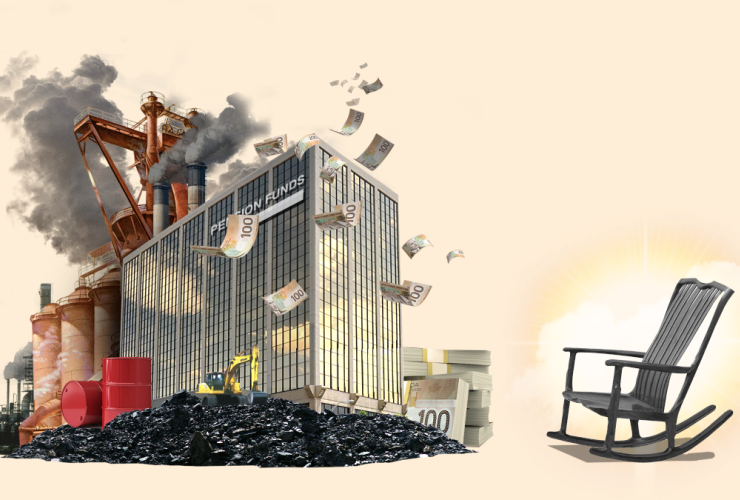Two new net-zero announcements from Canadian pension funds show that investors are beginning to understand the dangers the climate crisis poses to their investments and the planet.
While these announcements are signs of progress, funds will need detailed plans, timelines, and interim targets to truly align our pension fund portfolios with a climate-safe future.
In November, the Investment Management Corporation of Ontario (IMCO) and OMERS became the third and fourth pension funds to announce net-zero commitments following previous announcements from the Caisse de dépôt et placement du Québec (CDPQ) and the Ontario Teachers’ Pension Plan (OTPP).
A closer look at these essential commitments reveals disparities in the progress each pension manager has made in developing its climate strategy. The first Canadian fund to set such a goal, CDPQ, has led the way in acting on climate-related financial risk.
As part of a broad strategy, CDPQ has moved to exclude investments in oil producers from its portfolio by the end of 2022, stating, “We believe this is in the interests of our depositors, our portfolio companies and the communities we invest in.”
OTPP has set the most ambitious carbon reduction goals of any Canadian fund, with a plan to cut portfolio emissions intensity by 67 per cent below 2019 levels by 2030, with an interim target of 45 per cent by 2025.
OTPP has also fleshed out more details, creating new investment teams dedicated to seeking opportunities in climate solutions and driving the energy transition, setting transition expectations for its held companies, and developing decarbonization guidance for high-emitting sectors.
However, OTPP has not yet said it will exclude fossil fuels from its portfolio and has not explained how its current significant holdings in oil, gas and pipelines could credibly align with its net-zero plan.
As the details of OMERS’ and IMCO’s recent announcements are still under development, the jury is out on the ultimate credibility of their net-zero commitments. IMCO discloses little information on its holdings, and its beneficiaries will need to see real climate-related disclosure to trust it is managing climate risk and is on track to zero emissions.
OMERS’ announcement builds on its existing target to reduce the carbon intensity of its portfolio of 20 per cent below 2019 levels by 2025, and its increasing investments in renewables.
OMERS owns Leeward Renewable Energy (a developer of wind, solar, and energy storage) and this year purchased additional stakes in renewable energy companies in India, Australia, and the United States.
However, OMERS continues to hold high-risk investments in fossil fuel companies, with filings showing its public equity portfolio alone includes $900 million in oil, gas, coal and pipelines.
OMERS has not announced plans to screen out new investments in fossil fuels, nor has it detailed a phase-out for existing fossil investments. As the global energy transition accelerates, these holdings face growing economic headwinds and technological disruption.
Canadians are seeing that the climate crisis already has us lurching from one emergency to another, and are questioning the wisdom of their pension funds financing fossil fuels on one hand while gesturing to vague net-zero announcements with the other. Pension plan members are already pressing their funds to disclose how they are meeting their fiduciary duty to beneficiaries in the era of climate change.
Pension funds need credible plans to back their net-zero commitments.
First, they must explain how they define net-zero emissions, and why their goal is net-zero rather than absolute-zero emissions.
Second, credible plans must include aggressive interim targets for cutting absolute emissions, and require profitable transition plans for high-carbon investments. Held companies must also be banned from lobbying against climate policies. In addition to transparent timelines for dramatically increasing investment in profitable climate solutions, plans must also include screens on investments in fossil fuel companies and a phase-out timeline for current fossil holdings.
Finally, fund manager compensation should be tied to the achievement of interim emissions reduction goals as the pension fund works toward net-zero.
Canadian pension funds should look to international leadership to understand how best to proceed. Dutch pension fund ABP, Europe’s largest, announced in October that it will rid itself of current investments in oil, gas and coal by 2023, stating it did not feel engagement would be effective in forcing fossil fuel companies to transform their business models.
More than 170 pension funds globally have partial or complete exclusions on fossil fuels. Many of these pensions, like Sweden’s AP1, are focusing instead on flowing capital into profitable climate solutions that will accelerate the transition while growing the fund sustainably.
The writing is on the wall for pension fund managers: investments in climate breakdown will threaten profits now and in the future. A recent round of net-zero announcements shows pension funds are getting the message.
But beneficiaries need to know their pension fund managers are serious about their commitments to drastically reduce emissions by 2050. In order to be taken seriously, funds must release credible plans for aligning their portfolios with a zero-emissions future.
Laura McGrath is the pension engagement manager at Shift Action for Pension Wealth and Planet Health, a charitable initiative that works to protect pensions and the climate by bringing together beneficiaries and their pension funds to engage on the climate crisis.







Comments